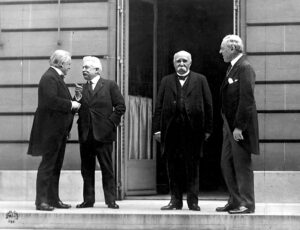We invite you to the event organised by European Network Remembrance and Solidarity! The aim of the debate accompanying the opening of the outdoor exhibition ‘After the Great War. A New Europe 1918–1923’ is to discuss the difficult heritage of the Paris Peace Conference, the contested regions.

On the one hand, the basic rule governing the new order was the possibility of self-determination, yet it was granted mainly to the victors on the other. Moreover, due to a complicated ethnic structure of East-Central Europe, it was impossible to draw clear border lines which would be satisfactory to all. In many cases borders were drawn with the use of military measures and without holding plebiscites. Another controversial decision was the creation of free cities.
Therefore, a number of disputed regions emerged – Trieste, Danzig, Memel, Silesia, Pomerania, and Transylvania being just some of the examples. They belong to the difficult heritage of the Great War.
PARTICIPANTS
Grzegorz Berendt
Ph.D Hab. Grzegorz Berendt, professor at the University of Gdańsk, is the author of over 100 scientific and over 30 popular science publications. He specialises in the history of Poland in the 20th century, particularly issues related to the mass murder of Jews on Polish soil during the German occupation, the post-war history of the Jewish community as well as the social and political history of Gdańsk, Lębork, Puck, Pruszcz Gdański and Kashubian rural communities.
Štefan Čok
Dr Štefan Čok is a member of the Slovene minority in Italy. He achieved a Master in History in Trieste and a PhD in History of Europe and the Mediterranean at the University of Primorska in Koper, Slovenia. Former President of the Trieste-Koper section of ISHA-International Students of History Association and of Study Center Dialoghi Europei, from 2015 he collaborates with the Historical and ethnological department of the Slovene National and Study Library (www.knjiznica.it) in Trieste.
Bartosz Panek
Bartosz Panek is a radio documentary maker with over 20 years’ experience. He studied in Warsaw and Trieste and holds a degree in international relations. Currently he supports Free Range’s creative division. Prize winner of Polish and international awards, including the Prix Italia for innovative documentary language.
Attila Pók
Attila Pók is Senior Researcher at the Institute of Advanced Studies Kőszeg. From 1996 until 2018, he was Deputy Director of the Institute of History at the Research Centre for Humanities at the Hungarian Academy of Sciences in Budapest. During 2007–2015, he was Secretary General of the Hungarian Historical Association, and he Visiting Professor of History at Columbia University in New York from 1998 until 2013. He is Chairman of the ENRS Academic Council.
Andrea Zannini
Andrea Zannini teaches History of Europe at the University of Udine, where he was Director of the Department of Humanities and Cultural Heritage Studies (Seal of Excellence), until 2021. He has written on the economic and social history of the Venetian Republic, emigration from Veneto to Brazil, the history of the Resistance. He has about 170 publications, including articles and monographs.
The event will take place on 23 September at 17:00 at Il Circolo della Stampa di Trieste, Corso Italia 13 Trieste.




